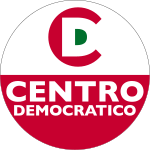
The Moderates are a centrist political party in Italy, active mainly in Piedmont, but also in Lombardy, Emilia-Romagna, Campania and Sicily. The party, whose leader is Giacomo Portas, is associated with the centrist party Italia Viva.
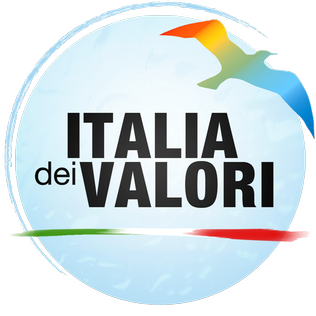
Italy of Values is a populist and anti-corruption political party in Italy. The party was founded in 1998 by former Mani pulite prosecutor Antonio Di Pietro, who entered politics in 1996 and finally left the party in 2014. IdV has aimed at gathering and giving voice to different sectors of the Italian society. From the beginning of its existence one of its major issues has been the so-called "moral issue". In the early 2010s, IdV was eclipsed by the new-born Five Star Movement, founded by comedian Beppe Grillo, which used the same populist and anti-corruption rhetoric.

New Force is an Italian neo-fascist political party. It was founded by Roberto Fiore and Massimo Morsello. The party is a member of the Alliance for Peace and Freedom and was a part of the Social Alternative from 2003 to 2006. The party has often been strongly criticized for its radical positions and for acts of violence involving some militants. It was also the protagonist of political campaigns opposed to same-sex marriage and immigration to Italy.

Liga Veneta Repubblica is a Venetist political party in Veneto, Italy. The party maintains a mildly separatist position and campaigns for the self-government of Veneto.

Lega Alpina Lumbarda was a left-wing regionalist political party in Italy, based in Lombardy. The party, an alternative to Lega Lombarda–Lega Nord, was led by Elidio De Paoli throughout its existence.
The Liberals Sgarbi, then renamed Liberals Sgarbi – The Libertarians, was a minor personalist-liberal political party in Italy.
The Pact for Autonomies was an electoral pact signed by Lega Nord (LN), a federation of regionalist parties active in Northern and Central Italy, and the Movement for the Autonomy (MpA), a Sicilian-based regionalist party, for the 2006 general election.
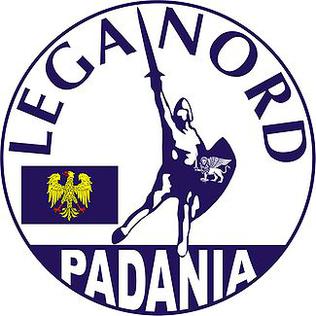
Lega Friuli-Venezia Giulia, whose complete name is Lega Friuli-Venezia Giulia per Salvini Premier, is a regionalist political party active in Friuli-Venezia Giulia. The party was a "national" section of Lega Nord (LN) from 1991 to 2000 and has been the regional section of Lega per Salvini Premier (LSP) in Friuli-Venezia Giulia since 2020.
The United Populars is a regional Centrist and Christian-democratic political party based in Basilicata, Italy.
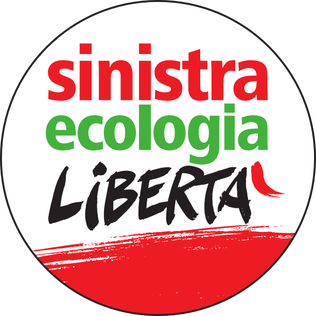
Left Ecology Freedom was a democratic socialist political party in Italy whose bulk was formed by former members of the Communist Refoundation Party.
Va' pensiero Padania was a Northern-Italian electoral list for the 2001 general election.

Alliance for Italy was a centrist political party in Italy.
Rights and Freedom was an Italian political party. It was founded on 22 November 2012 by a splinter group from Italy of Values (IdV). The party's spokesperson was Massimo Donadi, IdV floor leader in the Chamber of Deputies from 2006 to 2012.

Civic Choice was a centrist and liberal political party in Italy founded by Mario Monti. The party was formed in the run-up of the 2013 general election to support the outgoing Prime Minister Monti and continue his political agenda. In the election SC was part of a centrist coalition named With Monti for Italy, along with Union of the Centre of Pier Ferdinando Casini and Future and Freedom of Gianfranco Fini.

The South American Union of Italian Emigrants is an Italian political party representing Italian minorities in South America, especially Argentina and Brazil.
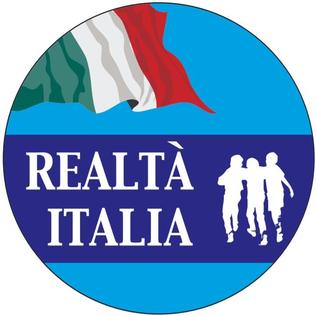
Reality Italy was a regional political party active in Italy's mainland South.
European Choice was a pro-European and primarily liberal electoral alliance of political parties in Italy formed to contest the 2014 European election on a platform influenced heavily by the Belgian MEP Guy Verhofstadt.

Lega per l'Autonomia – Alleanza Lombarda, also known as Lega per l'Autonomia Lombarda, was a left-wing regionalist political party in Italy, based in Lombardy.
Gian Carlo Oli was an Italian lexicographer.
More Europe is a liberal and pro-European political party in Italy, part of the centre-left coalition and member of the Alliance of Liberals and Democrats for Europe Party.
